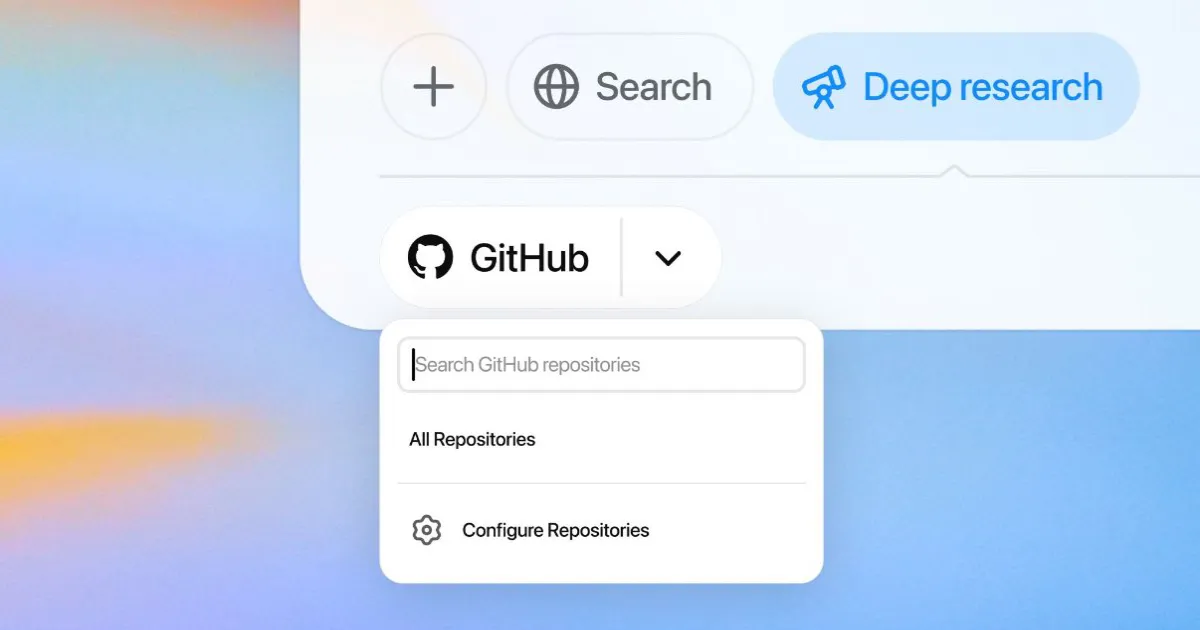ChatGPT Deep Research now connects to GitHub

OpenAI is taking another major step in evolving its AI assistant, ChatGPT, into a more powerful research and development tool. On Thursday, the company announced a new feature for its AI-powered "deep research" tool—an integration with GitHub, now available in beta. This marks the first official “connector” for ChatGPT’s deep research functionality, allowing developers to directly analyze GitHub codebases and related documentation through natural language queries.
You can now connect GitHub repos to deep research in ChatGPT. 🐙
— OpenAI Developers (@OpenAIDevs) May 8, 2025
Ask a question and the deep research agent will read and search the repo’s source code and PRs, returning a detailed report with citations. Hit deep research → GitHub to get started. pic.twitter.com/cdrQChfAU3
What the GitHub Connector Enables
With the new GitHub connector, users of ChatGPT—specifically those on the Plus, Pro, and Team plans—can now explore and interact with codebases more intelligently. Developers can ask ChatGPT to:
- Answer questions about a codebase's structure and logic
- Summarize technical documentation and code patterns
- Decompose product specifications into implementation steps
- Understand API usage with contextual code examples
The feature is designed to streamline engineering workflows, reduce ramp-up time on unfamiliar repositories, and enhance technical comprehension during development. OpenAI says support for Enterprise and Education users is coming soon.
Part of a Bigger Trend
This move aligns with a broader industry trend where AI companies are increasingly integrating their models with external platforms to provide deeper, context-aware assistance. Competitors like Anthropic have also begun offering similar features with Claude through their new "Integrations" offering.
OpenAI had previously supported a plug-in ecosystem for ChatGPT but deprecated it in favor of “custom GPTs.” This GitHub connector represents a new chapter in platform extensibility.
Balancing Usefulness with Reliability
While the feature offers convenience and potential productivity gains, OpenAI is transparent about its limitations. The model, like all large language models, can still "hallucinate" or produce incorrect outputs. OpenAI emphasizes that this tool is meant to support human developers—not replace them.
Privacy and data access are also being addressed. A company spokesperson assured that the tool adheres to GitHub permission settings, ensuring users can only access repositories they are authorized to view.
OpenAI’s Broader Push into Developer Tools
This announcement is just one part of OpenAI’s ongoing expansion into developer tooling. The company recently:
- Launched Codex CLI, an open-source coding assistant for terminal use
- Updated the ChatGPT desktop app to better interpret code from popular coding environments
- Reportedly moved to acquire Windsurf, a $3 billion deal involving another AI coding assistant
Additionally, OpenAI introduced fine-tuning options for its latest models, including the o4-mini "reasoning" model and the GPT-4.1 nano model. These allow developers—particularly verified organizations—to tailor AI behavior for domain-specific tasks using reinforcement-based training.
Looking Ahead
The GitHub connector marks a meaningful evolution in AI-assisted software engineering. While not without caveats, it promises to lower barriers for understanding and maintaining complex codebases. As more connectors and integrations roll out, OpenAI is poised to deepen its role not just as a chatbot provider, but as a foundational tool in the developer's toolkit.





